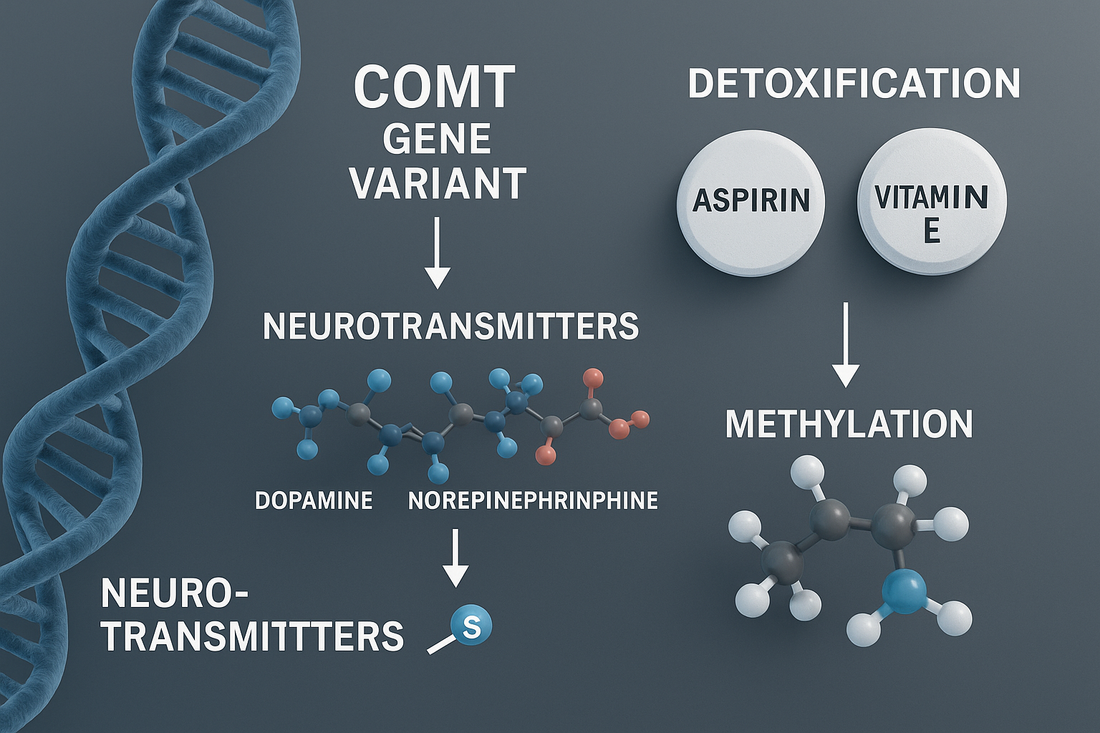COMT Gene Variants: Neurotransmitters, Methylation, Detoxification, and Cardiovascular Risk
Introduction
The Catechol-O-Methyltransferase (COMT) gene, located on chromosome 22q11, encodes an enzyme responsible for the methylation and breakdown of catecholamines—including dopamine, norepinephrine, and epinephrine—as well as catechol estrogens and xenobiotics.
Because of this central role, COMT polymorphisms affect:
-
Neurotransmitter balance and mood regulation
-
Methylation capacity and detoxification of catechol estrogens
-
Cardiovascular health, inflammation, and oxidative stress
One of the most clinically significant COMT variants is Val158Met (rs4680), which alters enzymatic activity and has been linked to psychiatric disorders, cardiovascular disease, and differential responses to antioxidants and aspirin.
COMT Function in Health
-
Neurotransmitter regulation: COMT degrades catecholamines, shaping synaptic dopamine and norepinephrine levels.
-
Methylation: COMT transfers a methyl group from S-adenosylmethionine (SAMe), tying it directly to one-carbon metabolism and folate cycle function.
-
Detoxification: COMT inactivates catechol estrogens (which otherwise can damage DNA) and xenobiotics.
-
Vascular function: By regulating catecholamines, COMT influences blood pressure, stress reactivity, and endothelial function.
COMT Val158Met Variant (rs4680)
The Val158Met SNP substitutes valine (Val) for methionine (Met) at codon 158. This alters enzyme thermostability and activity:
-
Val/Val (G/G) – High-activity enzyme (“warrior” type)
-
Faster clearance of catecholamines
-
Lower baseline dopamine/norepinephrine
-
More stress-tolerant but prone to reduced motivation or “dopamine-deficient” symptoms
-
Associated with higher homocysteine demand due to increased methyl use
-
-
Met/Met (A/A) – Low-activity enzyme (“worrier” type)
-
Slower clearance of catecholamines
-
Higher baseline dopamine/norepinephrine
-
More prone to anxiety, pain sensitivity, and stress reactivity
-
Less methyl group utilization, but higher oxidative burden from catechol accumulation
-
-
Val/Met (G/A) – Intermediate activity
-
Balanced neurotransmitter levels
-
Traits and risks lie between the extremes
-
COMT and Cardiovascular Disease
-
Catecholamine Balance
-
High catecholamine levels (Met/Met) may increase oxidative stress and endothelial injury.
-
Low catecholamine levels (Val/Val) can impair vascular adaptability and stress response.
-
-
Methylation Burden
-
Val/Val uses more methyl donors, potentially depleting SAMe and raising homocysteine—both cardiovascular risk factors.
-
Met/Met spares methyl donors but accumulates catechol substrates, leading to reactive oxygen species (ROS).
-
-
Detoxification of Catechol Estrogens
-
Inadequate clearance can raise risk of DNA damage, estrogen-sensitive cancers, and vascular inflammation.
-
Aspirin and Vitamin E in COMT Variants
Research shows that COMT variants influence the response to aspirin and vitamin E supplementation:
-
Met/Met (A/A, low activity):
-
Aspirin or vitamin E may be beneficial.
-
These individuals accumulate catecholamines, which promote oxidative stress. Antioxidant support helps mitigate endothelial injury.
-
Aspirin reduces platelet activation, while vitamin E reduces lipid peroxidation.
-
-
Val/Met (G/A, intermediate activity):
-
Neither aspirin nor vitamin E shows consistent benefit.
-
Their risk profile is more balanced; additional interventions may not alter outcomes.
-
-
Val/Val (G/G, high activity):
-
Aspirin and vitamin E supplementation are not recommended.
-
These individuals have low catecholamine burden and may actually experience harm from antioxidant supplementation.
-
Some studies suggest vitamin E increases stroke risk in Val/Val carriers.
-
Summary rule:
-
Give aspirin or vitamin E → to Met/Met (A/A) only.
-
Do NOT give aspirin or vitamin E → to Val/Met (G/A) or Val/Val (G/G).
Lifestyle and Nutraceutical Strategies for COMT Variants
For Val/Val (G/G) – High Activity
-
Support methylation:
-
Methylation Complete (B12, folate, betaine, SAMe).
-
Magnesium and zinc to support one-carbon metabolism.
-
-
Boost dopamine naturally:
-
Tyrosine-rich foods (fish, poultry, legumes).
-
Exercise to enhance catecholamine production.
-
For Met/Met (A/A) – Low Activity
-
Reduce oxidative stress:
-
Vitamin C-rich foods.
-
Consider aspirin or vitamin E:
-
In appropriate cardiovascular contexts and under supervision.
-
-
Stress reduction:
-
Meditation, yoga, breathwork to reduce catecholamine load.
-
For Val/Met (G/A) – Intermediate
-
Balanced approach:
-
Lifestyle optimization (exercise, Mediterranean diet).
-
Avoid unnecessary aspirin or vitamin E.
-
Peptide Therapies
-
MOTS-c: Improves mitochondrial resilience and stress handling.
-
BPC-157: Supports vascular and neurological healing.
-
KPV: Reduces inflammation associated with oxidative stress in Met/Met carriers.
Case Example
A 55-year-old woman with COMT Met/Met (A/A) presented with hypertension and high stress levels. She had elevated catecholamines and oxidative stress markers.
Plan:
-
Supplements: Curcumin Complex, CoQ10 Omega, methylation support.
-
Lifestyle: Daily meditation, reduced caffeine, aerobic exercise.
-
Medication: Low-dose aspirin prescribed due to family history of stroke.
-
Outcome: Improved blood pressure, reduced inflammatory markers, improved resilience to stress.
The Bottom Line
The COMT Val158Met polymorphism shapes how individuals handle stress, neurotransmitters, and vascular health.
-
Val/Val (G/G): Fast enzyme, low catecholamines, avoid aspirin/vitamin E. Focus on methylation support.
-
Met/Met (A/A): Slow enzyme, high catecholamines, higher oxidative stress. Consider antioxidant support, aspirin, or vitamin E.
-
Val/Met (G/A): Intermediate enzyme, balanced profile, no clear benefit from aspirin or vitamin E.
Personalized interventions—from methylation support to antioxidants to selective medication use—can optimize cardiovascular and neurological outcomes in COMT carriers.
References
-
Chen J, et al. Functional analysis of genetic variation in catechol-O-methyltransferase (COMT): effects on mRNA, protein, and enzyme activity in postmortem human brain. Am J Hum Genet. 2004.
-
Qi L, et al. Genetic variants in COMT and cardiovascular disease outcomes in relation to aspirin and vitamin E supplementation. Circulation. 2009.
-
Tunbridge EM, et al. Catechol-O-methyltransferase (COMT) and cognition. Annu Rev Psychol. 2006.
-
Lachman HM, et al. Human catechol-O-methyltransferase pharmacogenetics: description of a functional polymorphism and its clinical relevance. Pharmacogenetics. 1996.


